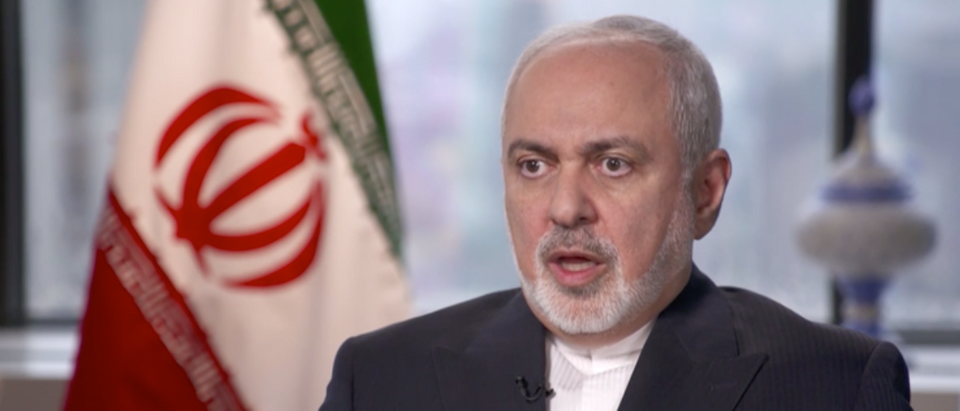Iranian Foreign Minister Javad Zarif’s appearance over the weekend on CBS’ Face the Nation showed him trying to convince someone — his minders at home, perhaps — that Iran is a moderate, trustworthy, terror-fighting country.
The designation of the Iranian Revolutionary Guard as a terror organization and the end of oil waivers, he said, would “show the Iranian people that the U.S. is not worthy of being a negotiating partner,” and the Trump administration as “squeezing the Iranian people, not the government.”
He added, “When the Iranian people are pressured, they do not respond with submission, they respond with resistance. They want us to represent them.”
That last one is a dead giveaway that the mullahs are nervous.
Substantial post-Iran deal oil revenues (plus the hefty sum paid by the Obama administration) allowed the Iranian government to pursue a variety of priorities, all of them military and most of them outside the country. Domestic priorities have been generally non-existent and the Iranian people know it.
Since December 2017, they have been rising up across the country against in protest of the government’s external spending and lack of attention at home. That month, according to the Iranian Chamber of Commerce, 33 percent of Iranians lived below the poverty line, and the gap between the rich and poor was deepening.
Early protests were registered in 70 towns and cities, with at least 22 people killed and 3,700 arrested in the first three weeks. Protesters chanted, “Reza Shah, bless your soul,” and called for Khomeini to step down, shouting, “Khamenei, shame on you, leave the country alone.”
There were strikes of shopkeepers, whole bazaars in Tehran, Kermanshah, Arak and Tabriz. Economic protests emerged in Karaj, Qeshm, Bandar Abbas, and Mashhad and more. There were strikes by teachers, factory workers, university students, farmers, railway workers, and retirees. Truckers — a mainstay of the rebellion — have been on a rolling series of strikes in various locations for more than a year. They have so irritated the government that the Iranian judiciary announced that truckers face the possibility of the death penalty.
On the political side, workers in Ahvaz marked the 25th day of strikes with the chant, “Palestine and Syria are not our problem.” “Not for Gaza, not for Syria, my life only for Iran.”
Through the summer of 2018, Iranians in various cities protested a shortage of clean drinking water. Israeli Prime Minister Benjamin Netanyahu’s video message to the Iranian people offering Israeli water technology as a gift was vehemently rejected by the Iranian government, but nearly 100,000 Iranians joined the Israeli government’s Farsi-language Telegram account within 24 hours of the video going live.
The recent floods across Iran killed at least 80 people, in part because of the long-term water mismanagement Netanyahu addressed. The inability of the government to respond to the emergency and the humanitarian disaster it spawned has sparked new, angrier protests. The government finally resorted to importing Iraqi Shiite militias to work in the flooded areas.
There is also “White Wednesday,” the women’s protest against laws mandating the wearing of hijab. Shaparak Shajarizadeh, the iconic woman who stood on a utility box and waved her scarf, has been sentenced to 20 years in prison. But women across the country have carried on, removing their headscarves and dancing in public — something also forbidden to women. They are supported by husbands, brothers, and fathers. They, too, face arrest and imprisonment.
Nasrin Sotoudeh, a lawyer who defended White Wednesday women in court, has been sentenced to 38 years in prison and 148 lashes.
By the end of 2018, Amnesty International said Iran had arrested more than 7,000 people.
President Trump has been clear that his goal — the American government’s goal — is to drive down Iran’s oil and other revenues to create increasingly stark choices for the Islamic Republic.
At one time that would have meant choosing between Syria and Russian air defenses, or between Hezbollah and Yemen. But brave Iranian people are now forcing the government to consider controlling flood waters, repairing vast civilian damage from the floods, educating people, paving roads, controlling pollution, caring for the sick and elderly, and providing agricultural assistance in a country that should be — but isn’t — wealthy and tremendously productive.
Zarif told the truth in exactly one regard. “When the Iranian people are pressured, they do not respond with submission, they respond with resistance.”
Shoshana Bryen is senior director of The Jewish Policy Center in Washington, D.C. and the editor of inFOCUS Quarterly.
The views and opinions expressed in this commentary are those of the author and do not reflect the official position of The Daily Caller.


